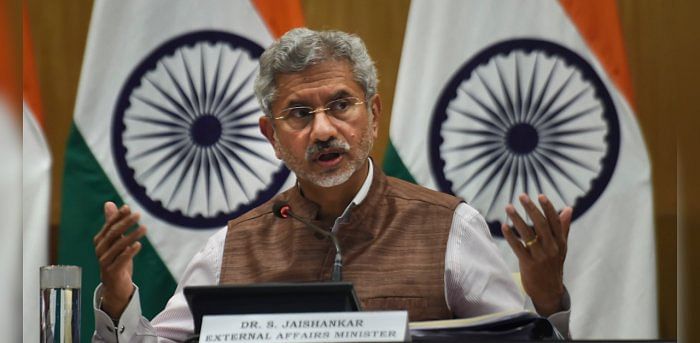
External Affairs Minister S Jaishankar will host his Russian counterpart Sergey Lavrov in a meeting on Tuesday and seek to allay Moscow’s concerns over India’s engagement with the United States, Australia and Japan in the Quad – a coalition the four nations forged to counter China’s belligerence and hegemonic aspirations in the Indo-Pacific.
Lavrov arrived in New Delhi late at night on Monday. He will meet Jaishankar on Tuesday, before flying to Islamabad. Moscow apparently sought to send out a message to New Delhi by clubbing his visits to India and Pakistan. New Delhi has been conveying its concerns to Moscow over increasing Russia-Pakistan cooperation, particularly in the defence sector. Russia too has been peeved over India’s growing defence relations with the United States as well as its decision to join the rest in the move to upgrade the Quad to the level of the Heads of Government.
The two sides, however, pinning hopes on the Jaishankar-Lavrov meeting to ease out the wrinkles in bilateral relations. They are also expected to announce a “breakthrough” in Russia-India ties after the meeting on Tuesday, a source aware of New Delhi’s engagement with Moscow told DH.
Also read — A Sino-Russian counter to the Quad summit
Lavrov will discuss with Jaishankar “topical issues of bilateral relations with an emphasis on the forthcoming high and highest-level meetings as well as the implementation of the outcomes” of the 20th annual summit, which Prime Minister Narendra Modi and President Vladimir Putin had held in Vladivostok in Russia on September 4 and 5 in 2019, Moscow’s diplomatic mission in New Delhi stated on Monday.
The annual India-Russia summit could not be held in 2020 due to the Covid-19 pandemic.
Lavrov had in December 2020 made some hard-hitting comments about the Quad. He had called the four-nation coalition a ‘divisive’ and ‘exclusivist’ tool being used by the US to implement its “devious policy” of engaging New Delhi in games against China as well as to undermine Russia’s close partnership with India.
New Delhi, however, went ahead and Prime Minister Narendra Modi on March 12 joined his counterparts in Japan and Australia – Yoshihide Suga and Scott Morrison – and the US President Joe Biden to elevate the Quad with a virtual summit.
Moscow on Monday subtly reminded New Delhi that the two nations shared the “same vision of the model of the emerging polycentric world order”. “We (Russia and India) attach great importance to collective work based on the principles of goodwill, consensus and equality, rejection of confrontation and bloc-type approaches,” it stated, tacitly hinting that Lavrov would seek to learn from Jaishankar how New Delhi would reconcile its engagement with Quad with the vision of the polycentric world order it had been sharing with Moscow. “In the spirit of the special and privileged strategic partnership (between India and Russia), we regularly check the status of our positions and coordinate approaches on a wide range of issues, including reform of the global governance and strengthening the UN's central coordinating role in international affairs.”
Moscow and Beijing have been articulating similar views on Quad – a coalition, which India, Japan, Australia and the US forged together as a bulwark of democratic nations to contain belligerence of China, not only along its disputed boundary with India, but also in the disputed waters of the South China Sea, the East China Sea and the Taiwan Strait.
Sun Weidong, Beijing’s envoy to New Delhi, of late tacitly called Quad a manifestation of “group politics” in the name of “multilateralism”. “Building small circles in the name of multilateralism is in fact ‘group politics’. ‘Multilateralism’ prioritising one’s own interests is still unilateral thinking. ‘Selective multilateralism’ is not the right choice,” he said, during a virtual discussion with eminent columnist Sudheendra Kulkarni.
Lavrov will discuss with Jaishankar the situation in the Asia-Pacific region and Afghanistan, said a spokesperson of the Embassy of Russia in New Delhi.
The External Affairs Minister is likely to convey to his counterpart in the Russian Government that New Delhi’s own vision on Indo-Pacific was inclusive and not targeted against any country. He will also drive home the point that India was also ready to broad-base its engagement on the Indo-Pacific beyond the Quad and ready to step up its cooperation with Russia in the region, sources in New Delhi said.
